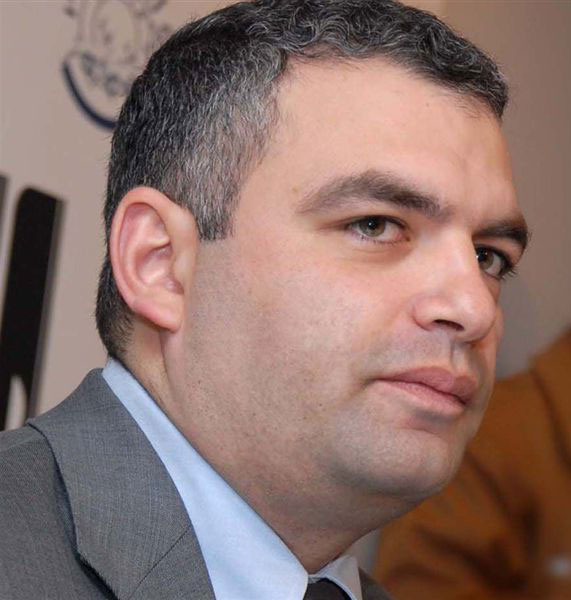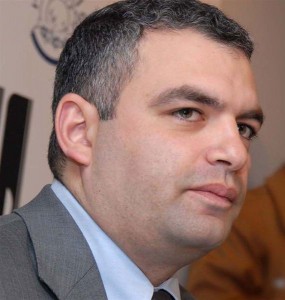Հայերեն | На русском | In English

The recognition of the Genocide is a process that can’t be suspended Interview with the Genocide Museum-Institute director Hayk Demoyan
 -Mr. Demoyan, the Turks have always tyrannized on the neighbouring and subjugated nations, they have organized massacres, destroyed cultures, taken away properties and have been particularly intolerant towards Christian nations and civilization. But most of all the Armenians have suffered from their barbarism. The genocide was planned many years before 1915 and besides massacre and the looting which were common to the Turks, were no news for us. Why weren’t we ready to confront the ill fate?
-Mr. Demoyan, the Turks have always tyrannized on the neighbouring and subjugated nations, they have organized massacres, destroyed cultures, taken away properties and have been particularly intolerant towards Christian nations and civilization. But most of all the Armenians have suffered from their barbarism. The genocide was planned many years before 1915 and besides massacre and the looting which were common to the Turks, were no news for us. Why weren’t we ready to confront the ill fate?
-Parallel to the weakening of the Ottoman Turkey the subjugated nations began to cherish a hope for self-government. The Armenian element, which had been under the Turkish rule for centuries, naturally, had to follow the example of the other nations subjugated by the Turks. As the nations which become independent –the Greeks, the Bulgarians and the others succeeded with the help of the third power, the Armenians also had the expectation to get assistance. But the circumstances were not favorable for us and turned out to be more powerful. The greatest problem was the statehood which prevented from the opportunity to organize general, planned struggle and confrontation. Still in the years preceding the genocide a great number of people had immigrated from the Western Armenia, which had essentially weakened the forces of the Armenian side. The immigration of the indigent mojaheds from Caucasus into the territories of the Western Armenia and their encroachment upon the Christian nations, particularly upon the Armenians had contributed to it. I think the unsubstantiated belief towards the Young Turks who had overthrown the sultanic regime also had its negative effect n the result of which the Turks could easily disarm the Armenians. Many people handed over the arms voluntarily. Eventually, the young Turks were infected with the mad idea of Pan. Turkish-ravings of forming Great Turkey which would stretch from Bosfor to Alta. And the Armenian issue as an essential obstacle to realizing Pan-Turkish, was put on the agenda again and the monstrous plan “Armenia Without the Armenians” was revived.
-How will you define the works done in the field of Armenian Genocide Investigation? Have you been able to carry our demand from the moral into the legal field.
-For the full investigation of the genocide even the efforts of the several generations won’t b enough for us. Today there are themes having to do with the genocide that aren’t investigated at all. Namely the full investigation of the genocide is out of the question and there is still a lot to do. The issue of the genocide is arisen in different schools of historical science, which sometimes have polemical points of view. I am speaking about the historical science of Armenia and Armenian Diaspora. The lock of the cadres has played an essential role and many completed works, so to say, don’t pass a scientific investigation. Their scientific language is not perceptible for a world which demands scientific wordings and not an emotional and sensual exposition. The works based on the local sources and the press aren’t particularly authentic, and not making use of foreign language sources devalues any investigation to some extent. Up to this day our historians have a difficulty to express themselves in a foreign language and naturally arising the theme before the international society is a great difficulty for them. The crystallized academism, the super-objective judgments and the supercritical points of view which aren’t justified, are noticed in the historical science of the Armenian diaspora.
-How do you estimate the process of the process of the international recognition of the Genocide and what changes has the Turkish side undergone?
-In my opinion if the Turkish side previously emphasized on the importance of influencing upon the international society and forming an opinion favourable for the Turks, then now the main target the Turkish society is considered to be the main target. Turkey first of all has a problem of convincing its own people that the genocide has not taken place. This is a dangerous tendency and in the nearest future can throw the Turkish society into civilized isolation. One thing is certain-the world is going to recognize the Armenian genocide and the Turks can slow down that process to come extent, but they can’t suspend it.
-What legal consequence will the recognition of the Genocide have? Strange as it it’s the historians don’t have identical opinions over this issue.
-The moral consequences of the genocide are much clearer. Personally I am against private solutions, such as insurance sums received from foreign banks and so on. The financial problems connected with the genocide must be resolved in one package. In any case it’s not excluded that the international recognition of the genocide will give the Armenians the opportunity to address to the court and demand the property of their ancestors, including real estate. I want to mention that the Genocide museum displays one part of the Armenian as well as the Turkish history. And the citizens of Turkey, who don’t want to be deceived, must come and witness the closed pages of their history. I am sure that one day the Turkish will have the courage to encounter their past. I any case they don’t have another choice.